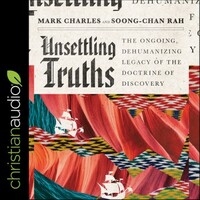You need to sign in or sign up before continuing.
Take a photo of a barcode or cover
95 reviews for:
Unsettling Truths: The Ongoing, Dehumanizing Legacy of the Doctrine of Discovery
Soong-Chan Rah, Mark Charles
95 reviews for:
Unsettling Truths: The Ongoing, Dehumanizing Legacy of the Doctrine of Discovery
Soong-Chan Rah, Mark Charles
hopeful
informative
medium-paced
Aptly titled. This is a non-stop fire hose of disturbing truths.
Mark Charles, a Navajo Reformed pastor, sheds light on and denounces the “doctrine of discovery,” which was the bogus religious justification for America’s violent colonizing of Turtle Island (the Native name for our continent). Charles presents the accumulated theological context that led up to the creation of this “doctrine,” starting by showing the creation of Christendom (“Christian Empire”) with Constantine. Charles says “every heresy needs a replacement Messiah instead of Jesus” (since he won’t serve its purposes) and Constantine was quickly presented as such by Christian historians of the 4th-5th centuries. It’s hard to throw a wet blanket on Church History because we all know it has some seriously ugly areas (as human history in general tends to), but Charles really pulls it off by showing Augustine & Thomas Aquinas’ bolstering violent Christendom. Augustine wrote about the role of the “Christian King” and condoned violent action towards pagans and Thomas Aquinas straight up encouraged executing heretics. Listen to this section from Summa Theologica:
“[Heretics] deserve not only to be separated from church by excommunication but also severed by the world by death. Wherefore if forgers of money and other evil doers are condemned to death by the secular authority much more reason is there for heretics as soon as they are convicted of heresy to not only be excommunicated but even put to death.”
So you can see how road was paved for violent action towards the “pagans” and “heretics” in the way of America’s Manifest Destiny, conquering Sea To Shining Sea. You can even see it in the justification for Native assimilation: “Kill the Indian, save the man.”
Having already dampened Augustine & Aquinas, he manages to dampen Jonathan Edwards. Dude had slaves! Oof. But wait, it gets worse! Two whole chapters exposing Lincoln’s white supremacism. I know, you probably just gave up reading this. But he solidly explains how Lincoln was not a hero, but a political pragmatist (as it relates to emancipation). Listen to this answer from Lincoln in a presidential debate:
“I am not and nor have I ever been in favor of bringing about in any way the social and political equality of the white and black races. That I am not nor ever have been in favor of making voters or jurors of negros nor of qualifying them to hold office nor of qualifying them to intermarry with white people. There is a physical difference between the white and black races which I believe will forever forbid the two races living together on terms of social and political equality. There must be the position of superior and inferior and I am, as any other man, in favor of having the superior position assigned to the white race.”
Just as with Constantine, Abraham Lincoln served as the White Messiah America needed for the fulfillment of its Manifest Destiny and he more or less retains that status to this day. Charles’ conclusion:
“As Americans, we credit Abraham Lincoln with winning the Civil War, preserving our Union, and reestablishing the United States of America as a God ordained beacon of freedom and equality. But that is a myth. The war Abraham Lincoln actually won was the war of discovery and manifest destiny.”
Even now the doctrine of discovery serves as legal justification for the theft of Native lands.
Charles rightfully denounces American exceptionalism and the myth of “God’s chosen nation.” Then he pivots in an unexpected direction and discusses group trauma, yes of the Natives, but also of White America. Perpetrators and their ancestors experience their own unique trauma and White America is in the midst of it, going through all the phases of guilty denial, anger, justification, acceptance, conciliation, etc. I found this pretty bold and helpful for myself as I locate my position in that group.
There’s nothing fun about this book, but it is really important. Much recommended.
“You can’t discover already inhabited lands.”
Mark Charles, a Navajo Reformed pastor, sheds light on and denounces the “doctrine of discovery,” which was the bogus religious justification for America’s violent colonizing of Turtle Island (the Native name for our continent). Charles presents the accumulated theological context that led up to the creation of this “doctrine,” starting by showing the creation of Christendom (“Christian Empire”) with Constantine. Charles says “every heresy needs a replacement Messiah instead of Jesus” (since he won’t serve its purposes) and Constantine was quickly presented as such by Christian historians of the 4th-5th centuries. It’s hard to throw a wet blanket on Church History because we all know it has some seriously ugly areas (as human history in general tends to), but Charles really pulls it off by showing Augustine & Thomas Aquinas’ bolstering violent Christendom. Augustine wrote about the role of the “Christian King” and condoned violent action towards pagans and Thomas Aquinas straight up encouraged executing heretics. Listen to this section from Summa Theologica:
“[Heretics] deserve not only to be separated from church by excommunication but also severed by the world by death. Wherefore if forgers of money and other evil doers are condemned to death by the secular authority much more reason is there for heretics as soon as they are convicted of heresy to not only be excommunicated but even put to death.”
So you can see how road was paved for violent action towards the “pagans” and “heretics” in the way of America’s Manifest Destiny, conquering Sea To Shining Sea. You can even see it in the justification for Native assimilation: “Kill the Indian, save the man.”
Having already dampened Augustine & Aquinas, he manages to dampen Jonathan Edwards. Dude had slaves! Oof. But wait, it gets worse! Two whole chapters exposing Lincoln’s white supremacism. I know, you probably just gave up reading this. But he solidly explains how Lincoln was not a hero, but a political pragmatist (as it relates to emancipation). Listen to this answer from Lincoln in a presidential debate:
“I am not and nor have I ever been in favor of bringing about in any way the social and political equality of the white and black races. That I am not nor ever have been in favor of making voters or jurors of negros nor of qualifying them to hold office nor of qualifying them to intermarry with white people. There is a physical difference between the white and black races which I believe will forever forbid the two races living together on terms of social and political equality. There must be the position of superior and inferior and I am, as any other man, in favor of having the superior position assigned to the white race.”
Just as with Constantine, Abraham Lincoln served as the White Messiah America needed for the fulfillment of its Manifest Destiny and he more or less retains that status to this day. Charles’ conclusion:
“As Americans, we credit Abraham Lincoln with winning the Civil War, preserving our Union, and reestablishing the United States of America as a God ordained beacon of freedom and equality. But that is a myth. The war Abraham Lincoln actually won was the war of discovery and manifest destiny.”
Even now the doctrine of discovery serves as legal justification for the theft of Native lands.
Charles rightfully denounces American exceptionalism and the myth of “God’s chosen nation.” Then he pivots in an unexpected direction and discusses group trauma, yes of the Natives, but also of White America. Perpetrators and their ancestors experience their own unique trauma and White America is in the midst of it, going through all the phases of guilty denial, anger, justification, acceptance, conciliation, etc. I found this pretty bold and helpful for myself as I locate my position in that group.
There’s nothing fun about this book, but it is really important. Much recommended.
“You can’t discover already inhabited lands.”
I really appreciated the content and the perspectives in this book. The most illuminating chapters for me were, by far, the ones toward the end of the book, where the authors unpack the complex legacy of Abraham Lincoln. This is history that we all need to be reading and engaging with. For the content, I'd give this book four stars.
The delivery and writing style were not as strong as I wished they would be for a subject this important. The writing felt stilted/wooden at times, which is perhaps due to the fact that it was coauthored.
I would absolutely recommend this book to folks who are passionate about this subject, because I think that people who really want to listen will stick it out. But I would not necessarily give this book to someone who is skeptical/unsympathetic toward the concerns of Native American peoples. I think the delivery would not be compelling enough for them. (I would, however, urge anyone to pick up this book and read the last chapters on Lincoln. Those chapters were compelling, well-presented, and a good challenge to those who have not considered the legacy of men such as Lincoln.)
(thanks to Netgalley and IVP for this ARC)
The delivery and writing style were not as strong as I wished they would be for a subject this important. The writing felt stilted/wooden at times, which is perhaps due to the fact that it was coauthored.
I would absolutely recommend this book to folks who are passionate about this subject, because I think that people who really want to listen will stick it out. But I would not necessarily give this book to someone who is skeptical/unsympathetic toward the concerns of Native American peoples. I think the delivery would not be compelling enough for them. (I would, however, urge anyone to pick up this book and read the last chapters on Lincoln. Those chapters were compelling, well-presented, and a good challenge to those who have not considered the legacy of men such as Lincoln.)
(thanks to Netgalley and IVP for this ARC)
Clearly written for a Christian audience, of which I am not lol
I've always wondered how Christianity started with Jesus rejecting earthly power and the apostles being persecuted by Rome, to somehow colonization and conquistadors in the name of Jesus, to modern white American Christians holding all political power. This book does a great job of tracing that history. Highly recommend this book.
informative
reflective
sad
medium-paced
3.5. Interesting book. If it hadn't been an audiobook I don't think I'd have finished it bc I'm an atheist and don't really give a fuck what Christians think about anything, but this was a unique way to approach the issue.
The Doctrine of Discovery vs. “you can not discover a place already inhabited.” Everyone gets a reality check in this book. Highly recommend!
Clear-eyed, short, and accessible revelation of the ways that bad theology, racism, political opportunism, and greed combined to systematize the oppression of the indigenous peoples of the Americas. Much of this was completely new information to me until I heard Charles speak on this topic a few years ago. The book is a nice recapitulation and expansion on his core talk.
informative
reflective
medium-paced





